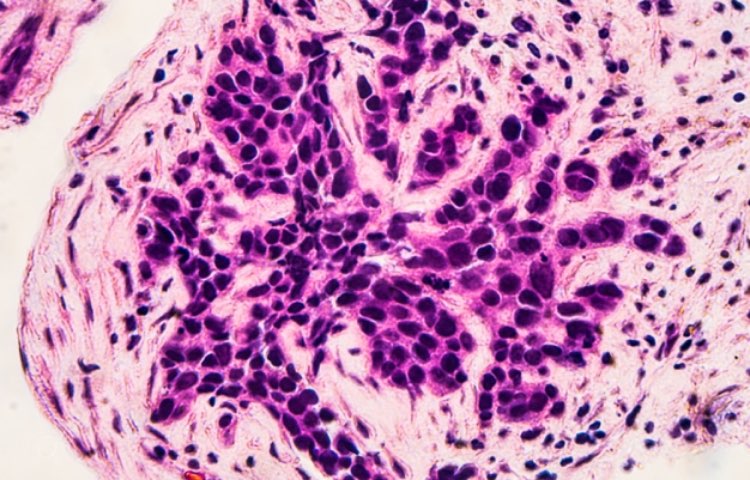Testing may identify patients who benefit from early HER2-targeted therapy
A study led by scientists at Sanford Burnham Prebys Medical Discovery Institute has identified a tumor marker that may be used to predict which breast cancer patients will experience resistance to endocrine therapy. The research offers a new approach to selecting patients for therapy that targets HER2, a protein that promotes the growth of cancer cells, to help avoid disease relapse or progression of endocrine-sensitive disease.
The study was published in the journal Nature Communications.
Nearly 80% of breast tumors are estrogen receptor (ER)-positive. For decades, these tumors have been treated with anti-estrogen (endocrine) therapies to lower estrogen levels and help slow the cancer’s growth. About 20% of breast cancers are also HER2-positive at diagnosis, and these tumors tend to be more aggressive and fast-growing, as HER2 is a receptor that when active, promotes the rapid growth of breast cancer cells.
“We know there is a subset of patients who are initially diagnosed with ER-positive, HER2-negative breast tumors, but their tumors convert to HER2-positive after they receive endocrine therapy,” says Svasti Haricharan, PhD, assistant professor in the Aging, Cancer and Immuno-oncology Program at Sanford Burnham Prebys and senior author of the study. “Unfortunately, this unleashes the detrimental effects of HER2, and patients become resistant to endocrine therapy—resulting in relapse, metastasis and death.”
With conventional endocrine therapy being unhelpful for these patients, Haricharan’s team examined how two genes, MLH1 and PMS2, affect HER2 activity. These genes are part of a biological system to “fix” DNA errors—but they also play a critical role in suppressing HER2. When these genes are turned off, HER2 becomes activated as soon as patients receive standard care endocrine therapy.
“Fortunately, there are tests for MLH1 and PMS2 activity that are now done routinely for colorectal and endometrial cancers,” says Nindo Punturi, a research assistant in the Haricharan lab and first author of the paper. “If we were to transition these tests to newly diagnosed cases of breast cancer, we could identify patients who may benefit from early HER2-targeted treatment—essentially shutting the door to HER2 activity before it gets started.”
The National Cancer Institute (NCI) estimates that 281,550 women in the U.S. will be diagnosed with breast cancer in 2021, and 43,600 women will eventually die from the disease. Some women whose MLH1 and PMS2 gene expression is low or absent may have an even greater risk of death.
“Our research efforts are all about getting the right treatments to the right people as soon as possible,” says Haricharan. “With so many excellent drugs at our disposal to treat breast cancer—including those that target HER2—it’s more a matter of selecting the available, appropriate drugs than searching for new ones. This research effort is an important step in that direction.”
Additional study authors include Nindo B. Punturi, Sinem Seker and Aloran Mazumder at Sanford Burnham Prebys; Vaishnavi Devarakonda, Rashi Kalra, Ching-Hui Chen, Matthew J. Ellis and Shyam M. Kavuri at Baylor College of Medicine in Houston; and Shunqiang Li and Tina Primeau at Washington University in St. Louis.
Research reported in this press release was supported by Department of Defense (DoD) Breast Cancer Research Program Breakthrough awards (W81XWH-18-1-0034 to SH, W81XWH-18-1-36 0035 to SMK), an NCI K22 Career Development award (CA229613 to SH), a Susan G. Komen Promise grant (PG12220321 to MJE), a Cancer Prevention and Research Institute of Texas Recruitment of Established Investigators award (RR140033 to Matthew J. Ellis), and NCI awards U10CA180821, U10CA180882 (to the Alliance for Clinical Trials in Oncology) and U24C196171.
The authors declare these competing interests: Matthew J. Ellis has intellectual property ownership and received royalties for the PAM50-based breast cancer test Prosigna. Over the last five years he has received ad hoc consulting fees and meals (less than $5,000 per year) from Abbvie, Novartis, AstraZeneca, Pfizer, Sermonix and Puma. Shyam M. Kavuri is a stakeholder in NeoZenome Therapeutics Inc. Shunqiang Li has received license fees from Envigo; as well as research funding from Pfizer, Takeda Oncology, Zenopharm, the National Institutes of Health, and the DoD outside of this project.
The study’s DOI is 10.1038/s41467-021-23271-0.
